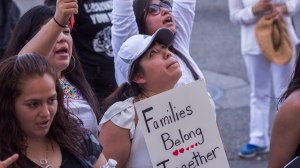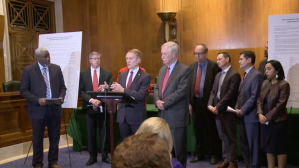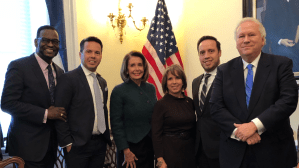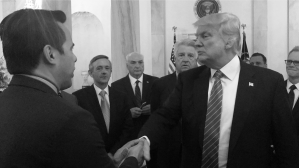In this series
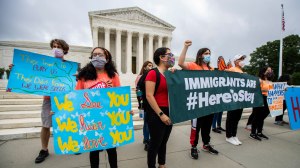
Among the thousands of immigrant Christians, church leaders, and advocates praying for a victory in this week’s US Supreme Court decision on the Deferred Action for Childhood Arrivals policy (DACA), one was an Episcopal priest on the team who worked on the case.
Armando Ghinaglia is himself a DACA recipient, a native of Venezuela who was raised in Texas. A curate at Christ Church New Haven and a law student at Yale, Ghinaglia worked for the Connecticut legal clinic that argued against the Trump administration’s rationale for rescinding DACA in 2017.
The Supreme Court ruled in its favor on Thursday.
The crux of the team’s argument, Ghinaglia said, was how little effort appeared to have gone into the decision to end a program that would devastate so many. Under DACA, young people who were brought into the country before age 16 can apply to stay and work in the US legally as long as they are currently working, honorably discharged from the military, or in school. To qualify, they must have no felony convictions and fewer than three misdemeanors.
While the arguments against resciding DACA were personal to Ghinaglia and steeped in his Christian belief in the imago Dei, his legal team also knew that Chief Justice John Roberts would be the likely swing vote, and, “we figured John Roberts was not going to be emotionally sappy.”
They stuck to a fairly dry defense, saying that the administration had violated the Administrative Procedures Act (APA), and the court agreed, 5-4.
“The ease with which people within the administration were willing to dispose of DACA residents” was insulting, Ghinaglia said. “I latched onto that.”
“For something as simple as removing an animal from the endangered species list,” he explained, the government usually provides thousands if not tens of thousands of pages of research and justification, called the “administrative record.” The administrative record for ending DACA was about 250 pages.
The Supreme Court found that the administration had indeed not considered alternatives or directives to mitigate the social and economic consequences of ending the program.
In ending the program, Roberts wrote in the majority opinion, “Acting Secretary [Elaine] Duke should have considered those matters but did not. That failure was arbitrary and capricious in violation of the APA.”
The team also tried to make the case that DACA should be subject to the equal protection clause of the 14th amendment, but only Justice Sonya Sotomayor agreed, claiming the administrations “discriminatory animus” had been downplayed in the majority opinion.
“I would not so readily dismiss the allegation that an executive decision disproportionately harms the same racial group that the President branded as less desirable mere months earlier,” Sotomayor wrote.
The court’s decision did not determine whether DACA itself is legal and did not shore the policy up against future challenges. It merely said that the Trump administration’s decision to end it did not follow legal procedure.
As a Christian, Ghinaglia said he has to balance his desire to win a case—especially one with a humanitarian outcome—with his convictions and values.
His legal team chose not to argue that DACA was about the worthiness of certain immigrants and assigning blame to others because he said that approach doesn’t fully acknowledge the humanity of the 700,000 people who depend on DACA for stability and security.
Late in the case, his team did opt to appeal to the utilitarian argument for DACA, he said. After COVID-19 struck, the team wrote a letter to court detailing how many DACA recipients were on the front lines of the pandemic and what their disappearance might do to the country.
Thursday’s victory is not final. The program does not provide permanent legal status, nor does it open a path to citizenship. But for today, DACA recipients—known as “Dreamers”— can enjoy a degree of security and protection from deportation after years of legal limbo.
It’s both a relief and “surreal” for people like 25-year-old North Carolina pastor Jose Ocampo, who lobbied against rescinding DACA two years ago.
After developing “an immunity to planning and getting my hopes up,” Ocampo can finally join his friends in mapping out post-college aspirations: continuing his work in ministry and possibly starting a family.
He says this knowing, as Ghinaglia does, that the reprieve could be short-lived.
“The country needs to figure out what they’re going to do with not only Dreamers but refugees and other immigrants,” Ocampo said, referencing the other groups who have had been affected by the Trump administration’s steep curtailment of most immigration policies including Temporary Protected Status, refugee resettlement, and grounds for asylum.
The administration still has ample options to reverse DACA, Ghinaglia said, but most would require it to come out firmly against Dreamers themselves. Ironically, he explained, if Trump had issued an executive order simply ending DACA because he found it beneficial to do so, the courts could have done little to stop it.
As Roberts wrote, “The dispute before the Court is not whether DHS may rescind DACA. All parties agree that it may. The dispute is instead primarily about the procedure the agency followed in doing so.”




